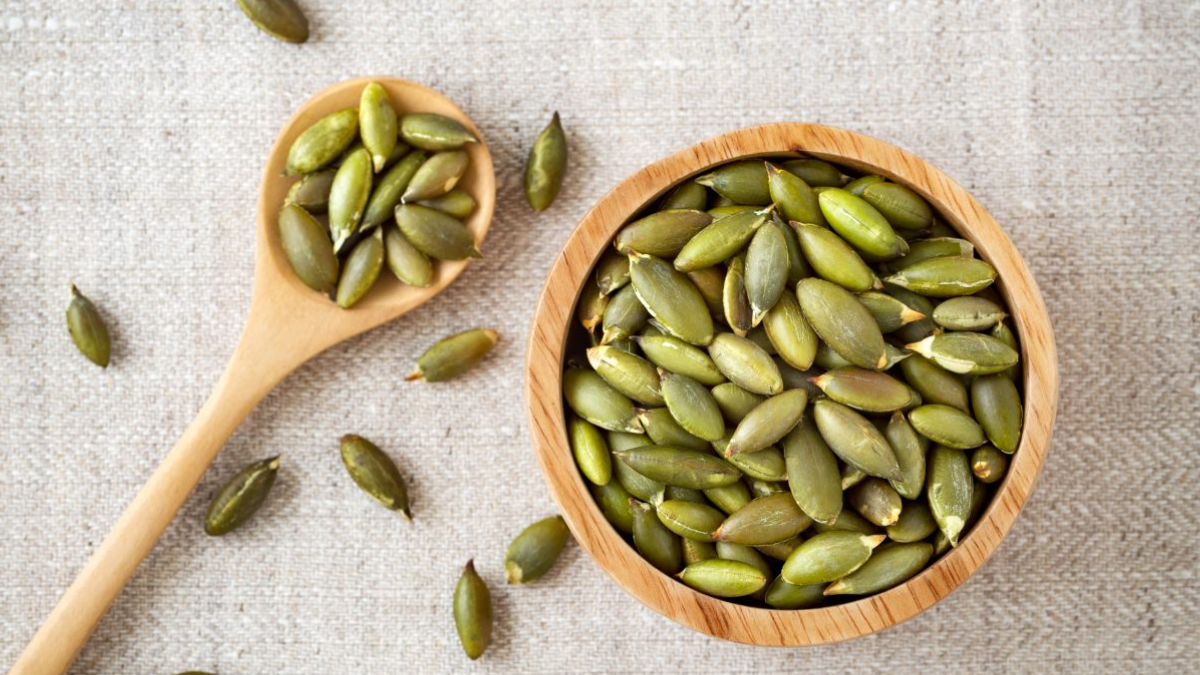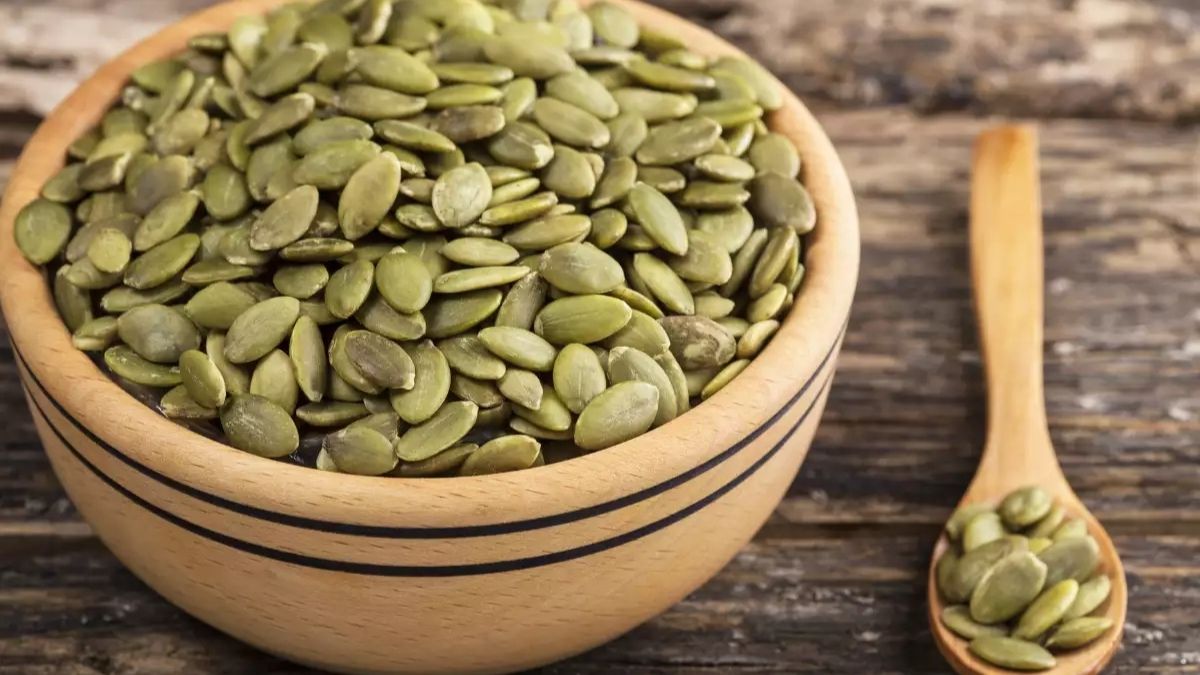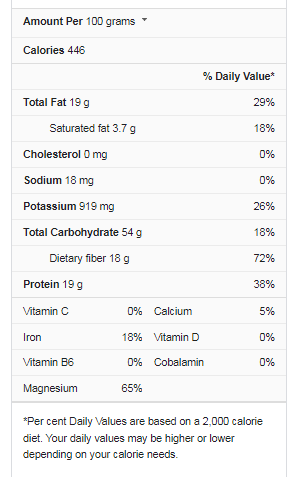Pumpkin seeds are a filling, calorie-dense snack that includes various vitamins and minerals. You might be concerned about the calories in pumpkin seeds if you’re attempting to lose weight. On the other hand, Pumpkin seeds can help prevent cravings for empty-calorie snacks while still providing your body with the nutrition it requires. The USDA offers nutritional information for 1 ounce (28g or 85 seeds) of whole roasted pumpkin seeds prepared without salt. One hundred grams of pumpkin seeds contains 54 grams of carbohydrate and 18 grams of dietary fiber.
Magnesium, manganese, iron, zinc, and copper are all found in raw pumpkin seeds, popularly pepitas. Magnesium aids in the improvement of mood and sleep, while manganese aids in the formation of collagen and supports skin and bone health. Energy generation is aided by iron and copper, and iron also aids in delivering oxygen to our cells. Zinc is suitable for your immune system, skin, and vision. One serving of pumpkin seeds can provide 14 to 42 percent of the daily requirement for these nutrients. Pumpkin seeds are high in vitamins and minerals such as manganese and vitamin K, which aid wound healing. They also include zinc, which aids the immune system’s fight against bacteria and viruses.
Pumpkin Seeds Nutrition Facts
Pumpkin seeds provide more than 19 grams of total fat per 100 grams. Fats added during the roasting process account for most of the fat content in packaged foods. There are 446 calories, 19 grams of fat, 3.7 grams of saturated fat, four hundred forty-six calories, 19 grams of fat, and 3.7 grams of saturated fat added if the seeds 100 grams.
What are Pumpkin Seeds?
The edible seed of a pumpkin or some other squash cultivars is known in North America as a pepita (from the Mexican Spanish: pepita de Calabaza, “small seed of squash“). The seeds are generally flat and asymmetrically oval, with a white outer husk that peels away to reveal a bright green tint.
Some cultivars don’t have husks and are grown for their edible seed. The seeds are heavy in fat (primarily linoleic acid and oleic acid), protein, dietary fiber, and other micronutrients, making them nutritional and calorie-dense. The hulled kernel or unhulled whole seed is called pumpkin seed, but the roasted final result is most typically utilized as a snack.
What is the Difference Between Pumpkin Seeds and Pepitas?
Pepitas and pumpkin seeds are two different types of seeds. (They aren’t even hulled pumpkin seeds!) A pepita is a hull-less pumpkin seed extracted from Syrian or Oil Seed pumpkins. Lady Godiva, Naked Bear, and Kakai Hulless Pumpkin are just a few of their unique names. Any other pumpkin type yields hulled seeds that are slightly fibrous and less delicate.
You can substitute one for the other. Still, there is a rule: pepitas can always be substituted for pumpkin seeds, but pumpkin seeds should only be substituted for recipes that call for pepitas as a garnish. So, while you wouldn’t use pumpkin seeds in this cilantro-pepita pesto, you could certainly use them as a garnish for this slow cooker sweet potato soup.
Pumpkin Seeds
How to Prepare Pumpkin Seeds?
A tiny handful of pumpkin seeds is a delicious snack at any time of the day. Pumpkin seeds, on the other hand, are easy to overeat. By measuring a few tablespoons and placing them in a serving bowl, you can keep track of portion proportions. Serve raw or roasted pumpkin seeds on top of soups and salads. You can also use them to add a delicious crunch to a turkey wrap with hummus.
Roasting pumpkin seeds is simple. Just follow these steps:
- Dry the pumpkin seeds with a paper towel.
- Allow seeds to cool and enjoy.
- After removing the seeds from a pumpkin, carefully rinse them in a colander and discard any stringy, wet pulp.
- After removing the seeds from a pumpkin, rinse them thoroughly in a colander and discard any stringy, damp pulp.
- Roast pumpkin seeds flat on a cookie sheet lined with aluminum foil at 250 degrees Fahrenheit. Cook for 45 minutes, or until golden brown.
Are Pumpkin Seeds Healthy?
Pumpkin seeds, like sunflower seeds, have a nutty flavor and delightful crunch, and a wealth of health advantages. Ten grams of protein, three grams of fiber, plus minerals like magnesium, zinc, and iron are all packed into each ounce. They’re also abundant in vitamin E, an antioxidant that aids in the body’s battle against free radicals, pollutants, and parasites.
Pepitas have roughly 170 calories per serving, with 110 calories from fat. Pepitas contain roughly 13 grams of fat (20 percent of the daily required requirement). Still, most of this is made up of good unsaturated fats and omega-3 fatty acids (the beneficial variety found in fish oil).
Pumpkin seeds are a rich source of many nutrients, with a tiny amount containing significant levels of vital vitamins and minerals. However, because they are heavy in calories, you should restrict your quantities to maintain a healthy weight.
Add a handful to your meal for potential health benefits like:
Anti-Inflammatory Effects
Pumpkin seeds are high in antioxidants, which help to protect our cells from disease and prevent inflammation in our bodies. They’re also high in dietary fiber, which can help to boost this effect. Pumpkin seeds’ anti-inflammatory properties have been shown in studies to help maintain a healthy liver, bladder, bowel, and joint function.
Lower Risk of Diabetes
Magnesium is abundant in pumpkin seeds, which most people do not receive enough in their diet. Magnesium helps to manage blood sugar levels, reducing your risk of diabetes. Studies have shown Pumpkin seeds to help persons with diabetes manage their blood sugar levels.
Anti-Cancer Properties
Pumpkin seeds have been shown in lab experiments to inhibit the growth of breast and prostate cancer cells, and they also cause apoptosis or the death of cancer cells. The potent antioxidant activity of pumpkin seeds is mainly responsible for these effects, although further research is needed to investigate a broader range of malignancies.
Healthy Heart Function
Pumpkin seeds have a high magnesium concentration, which helps to reduce and manage blood pressure. Magnesium-rich diets are linked to a lower incidence of stroke and mortality from heart disease due to this impact.
How to Roast Pumpkin Seeds?
To roast pumpkin seeds, stir them with a tiny quantity of oil and your favorite seasoning combination first. The oil will aid in the adhesion of the spices to the seeds. Roast your pepitas in a single layer on a prepared baking sheet for 45 minutes at 300°F. The pepitas will not burn because of the low temperature.
While raw pepitas are a nutritious, vegan, and gluten-free snack in and of themselves, roasting pumpkin seeds intensifies the deep, earthy flavor. There are various innovative ways to include pepitas into every meal throughout the day, from trail mix to salad dressing, muffins, and more.
Can you Eat Pumpkin Seeds While Pregnant?
Yes, pumpkin seeds are safe to eat while pregnant, and they include many of the essential elements for fetal development.
Iron
According to the Mayo Clinic, iron insufficiency is a common problem during pregnancy. Iron helps make red blood cells, which transport oxygen throughout the body. Iron is more vital than ever during pregnancy because the body creates a more significant number of red blood cells to sustain the baby’s growth.
B Vitamins
Energy production is the primary function of B vitamins, and energy needs are substantially higher during pregnancy. As a result, pregnant women require increased levels of B vitamins. According to the Mayo Clinic, folate is the essential B vitamin during pregnancy since it helps to prevent neural tube abnormalities. Pumpkin seeds supply around 4% of your daily value (DV) in one ounce.
Zinc
Zinc is a mineral that is especially crucial for pregnant women. According to the World Health Organization, zinc aids in the creation of DNA and helps drive the fast cell proliferation that happens in a developing newborn.
Conclusion
Pepitas and pumpkin seeds are occasionally used interchangeably. There is, however, a distinction between the two. Pumpkin seeds are the oval-shaped white or cream-colored seeds found inside pumpkins, such as those used to produce jack-o-lanterns. In most cases, pumpkin seeds are roasted in their shells. When you try to remove the seed out of the shell, you’ll see why this is the preferred method of eating pumpkin seeds.
Oilseed pumpkins and Syrian pumpkins are two types of pumpkins that contain them. When you cut open a pumpkin type with hulled seeds, you’ll find tiny, green pepitas waiting to be scooped out, rinsed, and eaten raw or roasted.




